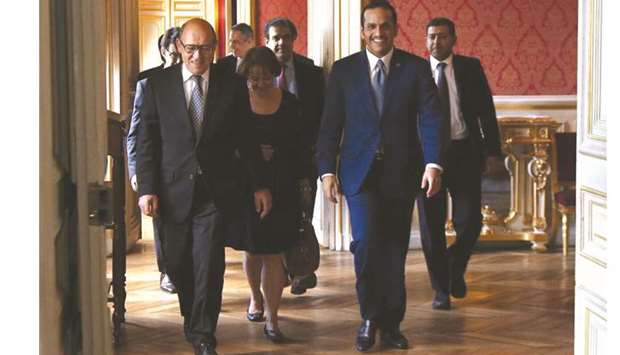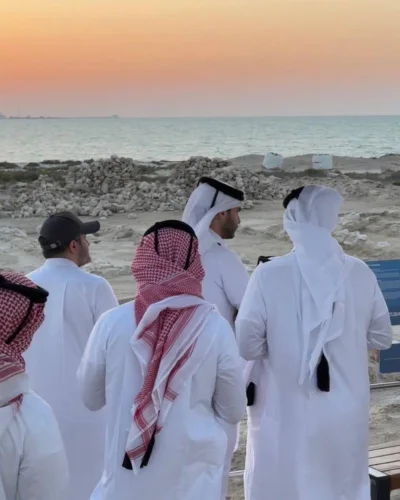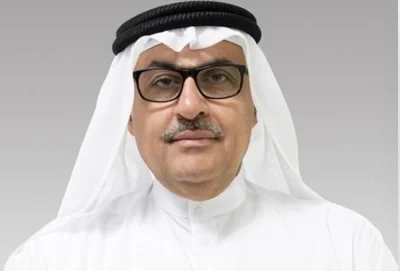Britain has urged Gulf states, including Saudi Arabia, to ease a blockade of Qatar and to find an immediate solution to the impasse through mediation.
Saudi Arabia, the UAE, Bahrain and Egypt cut diplomatic and transport links with Qatar a week ago, accusing Doha of backing extremism. Qatar vehemently denies all such charges.
“I am also concerned by some of the strong actions which Saudi Arabia, the UAE, Egypt and Bahrain have taken against an important partner,” UK Foreign Secretary Boris Johnson said after meeting Qatar’s Foreign Minister, HE Sheikh Mohamed bin Abdulrahman al-Thani in London.
Johnson said he would urge them “to ease the blockade on Qatar”. He will meet with his counterparts from Saudi Arabia, Kuwait and the UAE later this week.
The two ministers agreed on the need to support the Kuwaiti Emir Sheikh Sabah al-Ahmad al-Jaber al-Sabah in his efforts to mediate between Qatar and Saudi Arabia, Bahrain and the UAE.
Pledging to continue his reconciliation efforts, Kuwait’s Emir has stressed that he would not abandon his quest to remove the differences among GCC members.
“Every effort no matter how difficult was worth it to remove the differences and re-establish the GCC bonds,” he said.
Kuwaiti news agency KUNA quoted the emir as saying that he was from the generation that lived through the establishment of the GCC some four decades ago, adding that it was difficult for him to just stand silently without doing all he can to bring GCC brothers closer.
Speaking to reporters in Paris after meeting his French counterpart, Qatar’s foreign minister said his country supports Kuwait’s efforts to end the rift.
“Kuwait’s foreign minister is making efforts to mediate between our countries. We support this effort and our choice is to resolve this through dialogue,” he said.
HE Sheikh Mohamed, who is on a tour of European capitals, said there was no proof to accusations that his country financed terrorist groups, supported the Muslim Brotherhood and the Palestinian group Hamas and had close ties with Iran.
“Whatever is related to the collective security of the Gulf countries, Qatar is ready to negotiate ... but we have the right to react to these accusations that we are interfering in their internal affairs.
“Our foreign policy is subject to the sovereignty of our country and is based on our own assessment and our own principles.”
Sheikh Mohamed said the allegations over the Muslim Brotherhood were “false” and that it did not understand why it needed to cut ties with Hamas, since it was a resistance movement and not a terrorist group.
He said European countries, including France, were trying to ease tensions in support of Kuwait’s mediation efforts, and he believed that the United States, which was also backing mediation, wanted restrictions on Doha to be lifted.
Sheikh Mohamed denounced the sanctions as “unfair” and “illegal”.
Al Jazeera, the Doha-funded broadcaster, would never be closed as a result of external pressure, he said.
Italy and Qatar have agreed to continue their close economic and financial co-operation, the two countries said in a statement that signalled Italian support for Doha.
Qatari Finance Minister HE Ali Sherif al-Emadi met Italian Economy Minister Pier Carlo Padoan in Rome on the first leg of a tour of major Western capitals that will also take him to Paris, London, Berlin and Washington.
Meanwhile, Qatar Airways called upon the UN’s aviation body to declare a Gulf boycott against the carrier “illegal” and a violation of a 1944 convention on international air transport.
CEO Akbar al-Baker called the move an “illegal blockade” and urged the UN civil aviation branch to intervene.
Emir holds phone talk with Macron
HH the Emir Sheikh Tamim bin Hamad al-Thani last night held a telephone conversation with French President Emmanuel Macron. During the phone call, they reviewed the latest developments of the Gulf crisis as well as regional and international efforts aimed at resolving it, with emphasis on France’s supportive position of the dialogue among the GCC countries, and the importance of maintaining stability in the Gulf region.

HE the Foreign Minister Sheikh Mohamed bin Abdulrahman al-Thani met in Paris yesterday with his French counterpart Jean-Yves Le Drian.


